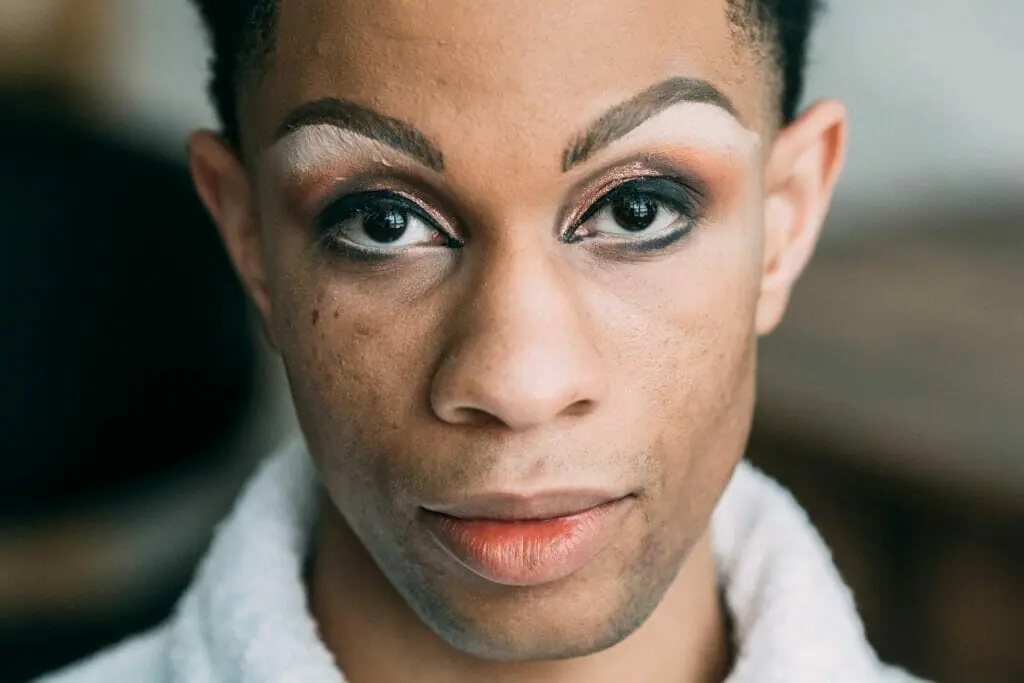There are many gender identities and sexual orientations that anyone can feel connected to or identify with.
More and more terms have been popularized over the years to represents the emotions and experiences of queer individuals and if you aren’t immersed in the LGBTQ+ culture or the queer community, you might not recognize a few sexual orientations and gender identities due to a lack of representation in mainstream media.
One such term is demiboy. Sadly it is one of the more misunderstood gender identities, so we are going to talk about what does it mean to be a demiboy, discuss the demiboy pride flag and its colors, then help you with some information to become a better ally to the demiboy community.

In this article we will cover...
What Does Demiboy Mean?
Demiboy is an identity that describes people who identify with both the agender and male genders. A demiboy may not identify equally with both, but even if they do, they will always identify as agender and male. Demiboys often use they/them or he/him pronouns.
Demiboy can also be used to refer to people that identify with some aspects of masculinity. It doesn’t usually matter whether the person was born with male or female genitalia. When learning about demiboys, it’s essential to understand that gender is on a spectrum, so no one has to identify fully as female or male. The term demiboy creates a safe space for individuals to connect with the parts of masculinity they’re only comfortable with.
The main characteristic of being a demiboy is that even though one feels different from their assigned gender, it isn’t enough to make a demiboy experience dysphoria or discomfort. This is unlike how it would feel for someone that is transgender and feels the push to change how they look to feel comfortable with their identity.

A demiboy can refer to a person that was assigned female at birth, is transmasculine, and who doesn’t identify as binary. They may feel much closer to being male than being female in the physical or social sense. Someone who was assigned male gender at birth yet identifies as demiboy may not feel it as much to want to change their gender or identify as a male to fit into a gender role.
Demiboy can also identify as transgender, non-binary, and demigender. They may feel more comfortable identifying on the spectrum rather than on one rigid gender identity. The complimentary term for someone who partially identifies as a female, girl, or otherwise feminine, regardless of their assigned gender at birth is a demigirl.
Above all understanding gender identities with respect to each individual and their identification is vital.
Be mindful that while some identities may have only slight differences, they may still mean a lot to someone. All you need to remember is that everyone’s experience of gender and attraction is different – and that it is for them alone to define.

Demiboy Pride Flag Meaning
Most queer identities have their own LGBTQ flag and Tumblr user Transrants designed the demiboy flag in 2015. However, he didn’t explicitly explain the meaning behind the flag. Even then, here are some meanings behind the demiboy pride flag colors that demiboys identify with:
– Blue is for manhood or masculinity.
– White is for non-binary or agender identities.
– Grey is for the grey areas and partial connections.
When Is Demiboy Pride Day?
Awareness, visibility, remembrance, and celebration are all important in increasing the acceptance and recognition of queer identities and queer folx around the world.
By observing an international day for demiboys, it is easier to for demiboys to talk to friends and loved ones – and to feel the love. It also helps foster awareness and increased sensitives from society at large.
So, mark your calendar and plan something special (even if it is just a social media post!) for June 22nd, which is Demiboy Pride Day.
Other Demiboy Information To Help You Be A Better Ally
Here’s what you should know to be a better straight ally to the demiboys in your life.
Understand the definition of demiboy
The first thing you need to know about becoming a better ally to the demiboys in your life is understanding the term.
You have already done this as we have now covered that a demiboy identifies as part male and part a different gender. The other gender is usually non-binary or, the person may identify as having no gender.
Use correct pronouns
The correct pronouns to refer to a demiboy will vary between individuals. When someone says they’re a demiboy, they might prefer to go by a gender-neutral pronoun, he/him pronouns, or both.
However, the best thing to do is always to ask someone what pronouns they prefer. If you’re talking to someone online and you aren’t sure whether or not to ask, look them up and see whether they have their preferred pronouns on their social media or personal page.
Don’t always assume that a demiboy will use ‘his’ or ‘her’ pronouns. Tastes and preferences vary depending on the individual.
You can help normalize the use of pronouns in your everyday life with small actions like giving your preferred pronouns at the beginning of an introduction, signing your emails off with them, or wearing LBGT enamel pins that declare your pronouns to the world.
Don’t worry if you aren’t used to asking about someone’s preferred pronouns. You will soon get used to it. Just remember that using someone’s preferred pronouns is a way of showing respect for their identity and that there’s nothing wrong with it. Remember that anyone can identify as a demiboy regardless of their biological sex.

Respect goes a long way
Treating a demiboy with respect shouldn’t be any different from treating anyone else with respect. Here’s how to do it if you think you may be uncertain about it:
1. Don’t put a demiboy down just because you think their gender is ‘new’ or ‘made up.’ Demiboy is a real identity, just like other gender identities.
2. Being a real ally or friend to a demiboy means you accept their gender identity and the person as they are. You aren’t a good ally if you don’t agree to use the correct pronouns and words. It’s not ok to misgender anyone or use the wrong pronouns on purpose. Ever.
3. Understand that their identity is valid and ‘they just aren’t going through something or a phase.’ You cannot decide for someone else what their gender identity is. Let them decide on their own. Demiboys usually have to deal with people calling them a ‘special snowflake’ or ‘fake.’ If you’re doing this to people because of their gender identity, understand that it’s similar to bullying or harassing.

Presentation isn’t gendered
Various demiboys may decide to present their gender identities in different ways. Just because someone is dressed in ‘typically male’ clothing and wears lipstick for men doesn’t mean they’re demiboy. Non-binary makeup might also be becoming increasingly popular but does not tell you someone’s gender – but rather tries to stop you from making assumptions about it in the first place.
Remember that gender is fluid. If someone’s identity changes, it doesn’t mean they’re bored or indecisive. No one can control the shift in their gender identity. Even then, the labels people use may change. They might find out that they weren’t right about the label they had chosen before. If they decide to change their labels, it’s ok, and it doesn’t mean their identities aren’t valid.
Every demiboys experience is different from another. Don’t generalize experiences just because you know one person’s story.
You will need to put in some effort to do the things we’ve mentioned above. All you require is an open mind and learn new habits. It might be challenging in the beginning, but you can do it. We all owe each other a little respect.
If you aren’t sure about anything, always try to ask. Before you say anything you might regret:
- Think about how you’d like to be treated or what you’d like said to you if you were in the same situation.
- If you wouldn’t be ok with it, don’t say it to the other person.
- Always treat other people the same way you’d like to be treated.
Remember that treating anyone with respect isn’t similar to giving them special treatment. No one, regardless of gender identity, needs special treatment. Basic respect is enough. Validation isn’t special treatment, and treating them like someone who deserves their fundamental human rights isn’t special treatment either.

Clear your head
Even if you don’t acknowledge it, you most likely have biases and prejudices that you should confront. It might be uncomfortable for you to realize it at first, but once you realize what they are, you will be able to defy them.
Confronting your biases includes educating yourself about what being demiboy is. Remember that the LGBTQ community no longer uses derogatory terms such as ‘homo’ or ‘homosexual’. Instead many prefer to use the term ‘gay’, ‘queer’, or ‘lesbian’ to describe themselves, and remember that the most commonly used pronouns for genderqueer folx are ‘they/them/theirs.
Never, ever, ever say “it” – because only a bad human would want to refer to another human in this way – regardless of gender.
Some people like to make crude comments or derogatory remarks and jokes towards gender-non-conforming folx. If you hear such remarks against your friend or other people in the queer community, speak up against such prejudices and let them know it isn’t right to encourage or take part in it.
The same goes for any jokes that are at others’ expense, especially queer marginalized communities and misunderstood identities such as intersex, asexual, transgender, agender, genderqueer, and genderfluid. We are not here to be the butt of any jokes – and quite frankly, are sick of it. It is not – and never was – OK.
Most times, offensive material is circulated on social media or WhatsApp. Remember to tell people that are making such comments why it’s wrong to do that.

It’s not your place to talk about their gender identity
Not everyone is comfortable with the whole world knowing about their gender identity. If a demiboy decides to come out to you, it’s not your job to tell the people around you about it.
Let them own their story and come out to other people when they’re ready. Sometimes, people don’t come out because the environments they’re in aren’t safe.
Some people are still learning about their gender identity
Not every demiboy has their gender identity down pat. Sometimes, people are still learning, exploring, and understanding what it means to be demiboy. Some people are scared about what it means to be demiboy or what that will mean in their school, colleges, or workplaces.
If someone doesn’t have all the answers about their gender identity, it’s ok to give them time and space to understand better.





